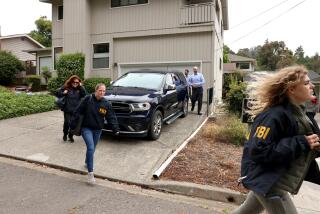FPPC Investigating Firm’s Contributions to Campbell
- Share via
SACRAMENTO — The state’s Fair Political Practices Commission on Monday launched an investigation into whether state Sen. William R. Campbell (R-Hacienda Heights) violated campaign contribution laws by not reporting a gift of free limousine service and the true source of a $5,000 honorarium arranged for him by a Louisiana asbestos consultant.
The agency is also investigating whether the consultant--Gordon Goldman, president of Asbestos Environmental Controls Inc. of New Orleans--may have violated state law by not registering his company as a “major donor” after the firm gave Campbell more than $10,000 in 1988, FPPC spokeswoman Sandra Michioku said.
“We’re looking into the alleged violations of the Political Reform Act, but this isn’t to say there has been any determination yet,” said Michioku, who added that the inquiry could take “a couple of months.”
The FPPC investigation comes after published reports that Campbell’s top aide, Jerry Haleva, repeatedly pressured state officials last year to continue using the New Orleans firm. Meanwhile, Goldman and his company donated $27,000 to Campbell in 1987 and 1988, including $16,000 from the company alone last year.
Other favors arranged by Goldman included free limousine service for Campbell and his aide during the 1988 Republican National Convention in New Orleans, and a $5,000 speaking engagement before a New Orleans Jewish group called Friends of Lubavitch Inc.
Campbell failed to report the limousine service on his disclosure forms. Campbell also listed the source of the $5,000 speaking fee as the Friends of Lubavitch, although the rabbi in charge of the group has maintained that the honorarium actually was paid by anonymous donors active with the group.
Michioku said Monday that state law requires elected officials to list all gifts in excess of $50, as well as the true source of all income and contributions. Also, the law in 1988 required anyone who donates more than $10,000 to one or more officials to file a “major donor” form with the FPPC, she said.
Campbell and his aide declined comment Monday.
So did Goldman, who quickly ended a telephone call with a reporter. “I don’t have time to waste on this nonsense,” he said.
In addition to the FPPC investigation, State Architect Michael J. Bocchicchio Sr. said Monday that his office is launching a review of its own to see if the state should sever its current contracts with Goldman’s firm because the company allowed its registration for asbestos removal work to lapse on June 10.
Phone Calls Described
Goldman’s company was one of several hired by the state architect’s office in recent years to test public buildings, then develop plans for removal of asbestos.
Bocchicchio said Monday that he talked to Haleva three times last year about Goldman’s participation in the asbestos removal program, including a June, 1988, telephone call made by Haleva on behalf of the New Orleans consultant. At the time, Bocchicchio’s office was threatening to cut off business with Goldman because the consultant had failed to register his company with the state.
But the consultant complied, registering his company by June 10, 1988, and Bocchicchio said he had no more contact with Campbell’s office until October, 1988. At that point, Bocchicchio said, he called Haleva as a courtesy to say that Asbestos Environmental Controls had missed important work deadlines and that the state would be canceling some contracts with the firm.
Bocchicchio said he hasn’t heard from Campbell’s office since then, adding that he didn’t interpret his contacts with Haleva last year as pressure or undue influence.
“I can’t say that I could feel anything directly like that,” Bocchicchio said.
Since then, records with the state’s Department of Industrial Relations show that Goldman’s company has allowed its registration to lapse although it still has hundreds of thousands of dollars worth of state contracts through 1990.
More to Read
Get the L.A. Times Politics newsletter
Deeply reported insights into legislation, politics and policy from Sacramento, Washington and beyond. In your inbox three times per week.
You may occasionally receive promotional content from the Los Angeles Times.










